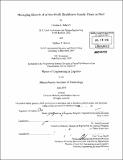| dc.contributor.advisor | Jarrod Goentzel. | en_US |
| dc.contributor.author | Heberley, Christine L. (Christine Laura) | en_US |
| dc.contributor.author | Hoover, Matthew F | en_US |
| dc.contributor.other | Massachusetts Institute of Technology. Engineering Systems Division. | en_US |
| dc.coverage.spatial | nwht--- | en_US |
| dc.date.accessioned | 2011-01-26T14:32:14Z | |
| dc.date.available | 2011-01-26T14:32:14Z | |
| dc.date.copyright | 2010 | en_US |
| dc.date.issued | 2010 | en_US |
| dc.identifier.uri | http://hdl.handle.net/1721.1/60835 | |
| dc.description | Thesis (M. Eng. in Logistics)--Massachusetts Institute of Technology, Engineering Systems Division, 2010. | en_US |
| dc.description | Cataloged from PDF version of thesis. | en_US |
| dc.description | Includes bibliographical references (p. 69). | en_US |
| dc.description.abstract | Partners in Health's (PIH) supply chain in Haiti has become strained over the past five years due to the organization's rapid growth. Under the current system, the majority of PIH's products are obtained through an annually placed order. All goods from this order are stored at the central warehouse in Cange, which acts as a hub, until those goods are needed at individual clinics. As annual orders increase in size to support PIH's expanding operations, the limited size of the central warehouse has become a constraint, making a change in current inventory policies necessary. In order to formulate revised inventory policies for PIH's Haiti operations, we developed a spreadsheet model that uses historical consumption data of drugs and medical supplies to forecast demand over the next three years. This demand data is then be used as input to run and compare the existing annual order policy with ordering policies with more frequent reviews. These inventory policies are then evaluated against the central warehouse size constraints to recommend an inventory policy better suited to meet PIH's needs. We find that more frequent orders drastically reduces warehouse space requirements while maintaining high service levels. It is hoped that PIH can continue to use this model to determine future inventory policy needs. | en_US |
| dc.description.statementofresponsibility | by Christine L. Heberley and Matthew F. Hoover. | en_US |
| dc.format.extent | 74 p. | en_US |
| dc.language.iso | eng | en_US |
| dc.publisher | Massachusetts Institute of Technology | en_US |
| dc.rights | M.I.T. theses are protected by
copyright. They may be viewed from this source for any purpose, but
reproduction or distribution in any format is prohibited without written
permission. See provided URL for inquiries about permission. | en_US |
| dc.rights.uri | http://dspace.mit.edu/handle/1721.1/7582 | en_US |
| dc.subject | Engineering Systems Division. | en_US |
| dc.title | Managing growth of a non-profit healthcare supply chain in Haiti | en_US |
| dc.type | Thesis | en_US |
| dc.description.degree | M.Eng.in Logistics | en_US |
| dc.contributor.department | Massachusetts Institute of Technology. Engineering Systems Division | |
| dc.identifier.oclc | 697534436 | en_US |
